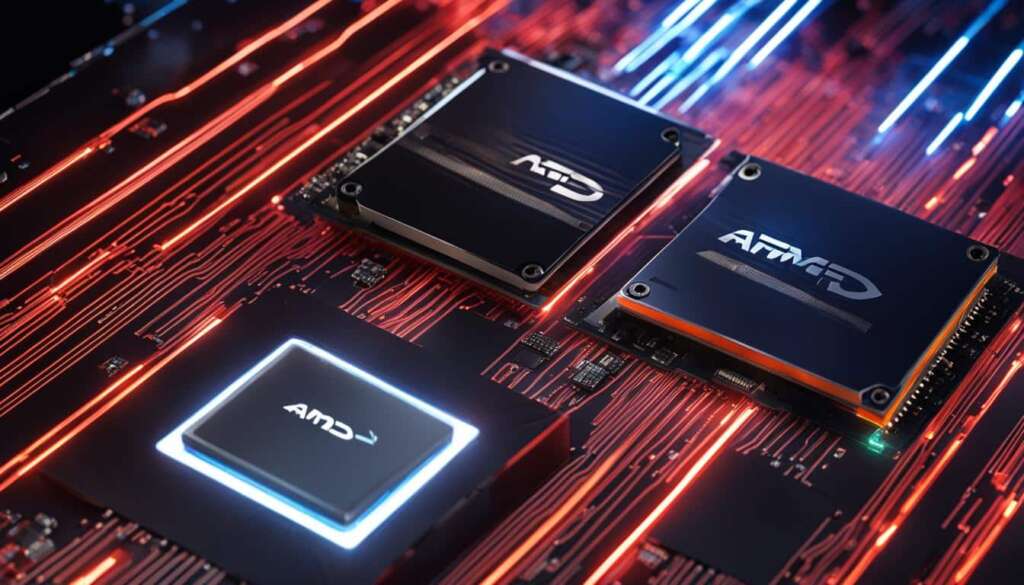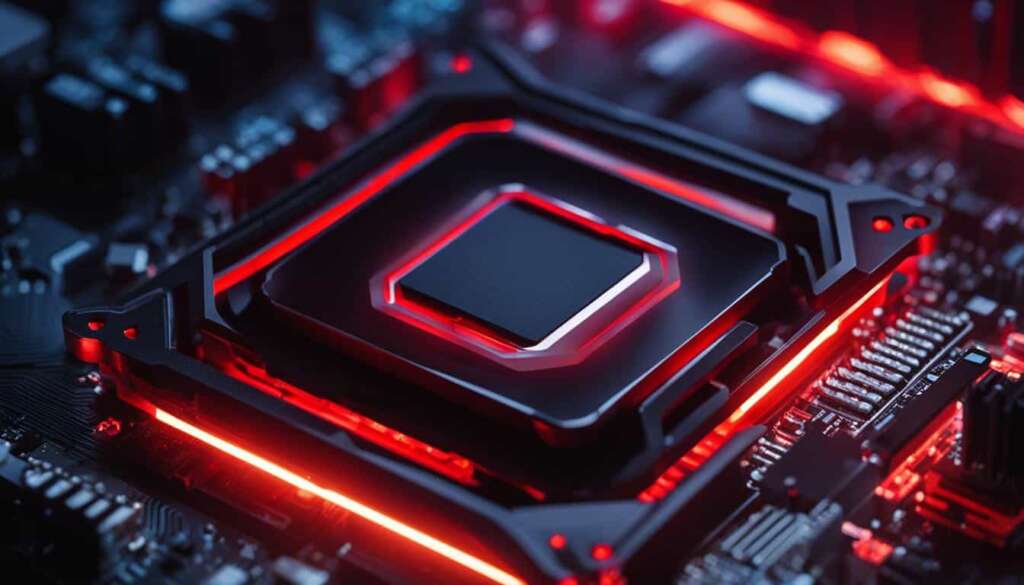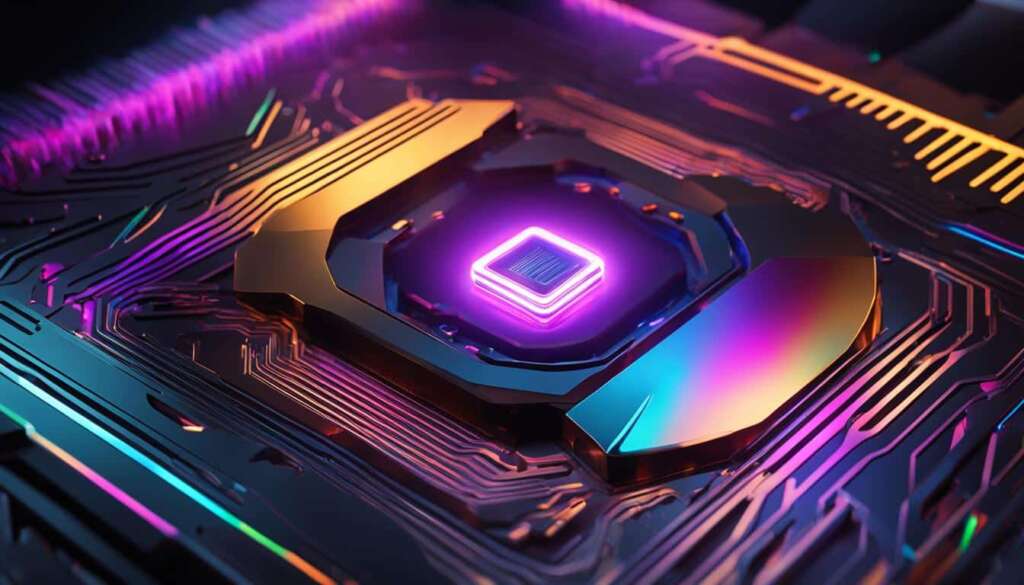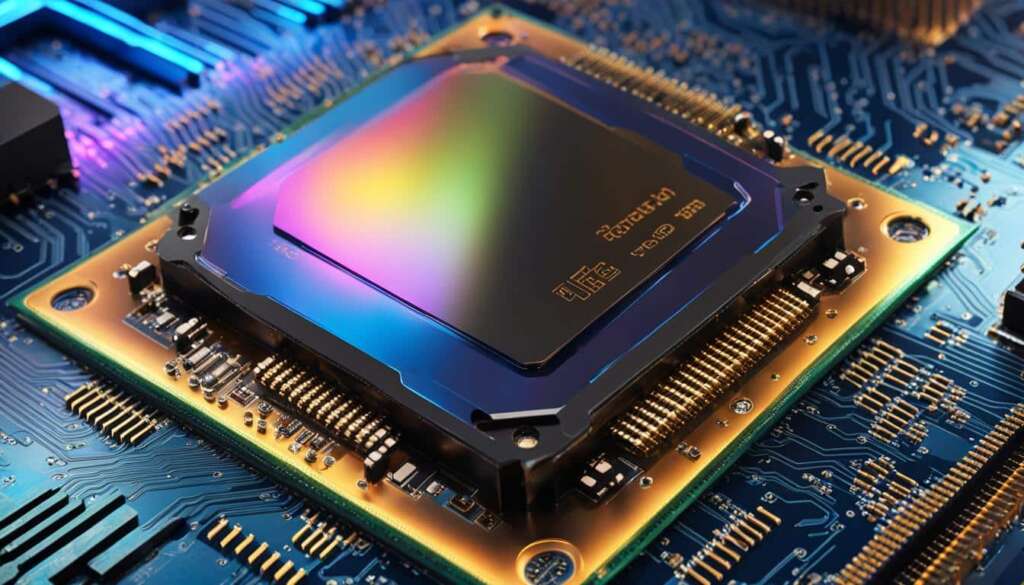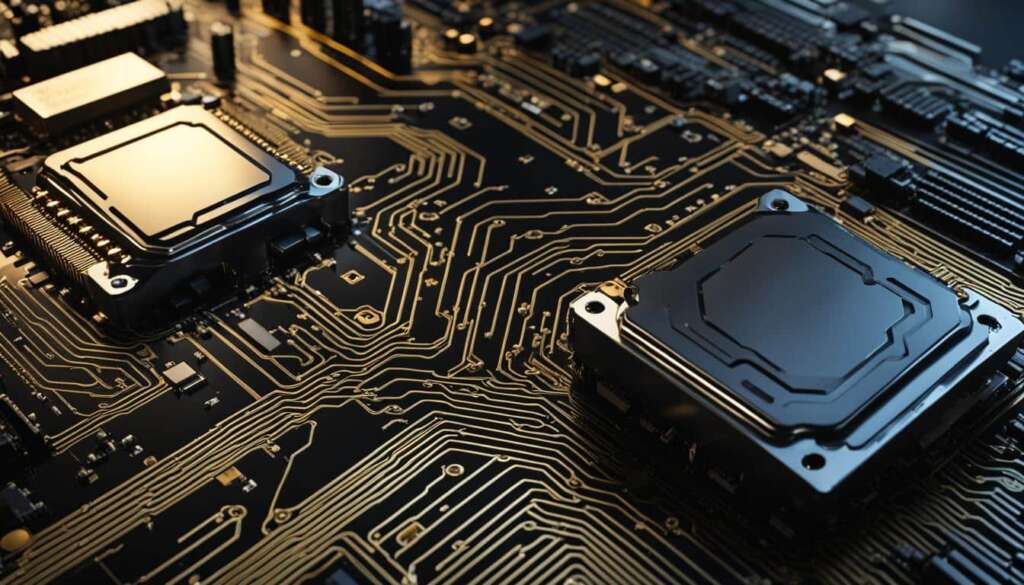Table of Contents
When choosing a CPU, two of the most popular options are AMD and Intel. While Intel’s chips are known for their balance of performance and value, AMD’s specialized X3D CPUs excel in gaming. This article will compare the performance and value of AMD and Intel CPUs based on factors such as pricing, gaming performance, content creation/productivity, specifications, overclocking, power consumption, drivers and software, process node, architecture, and security. By considering these factors, users can make an informed decision on which CPU brand to choose.
Key Takeaways:
- AMD and Intel are the top choices for CPUs.
- Intel CPUs offer a strong balance of performance and value.
- AMD’s X3D CPUs are specialized for gaming and provide excellent value.
- Consider factors such as pricing, gaming performance, content creation/productivity, specifications, overclocking, power consumption, drivers and software, process node, architecture, and security.
- Make an informed decision based on your specific needs and preferences.
Intel CPUs: Performance and Value
Intel has long been synonymous with high-performance CPUs that offer a winning balance of performance and value, particularly in the gaming and productivity space. The latest 13th-Gen Raptor Lake series continues this tradition by combining high-performance and efficiency cores to deliver excellent performance in both gaming and productivity workloads.
One of the standout features of Intel CPUs is their exceptional overclockability, providing enthusiasts and gamers with more headroom to push their systems to the limits. This makes Intel CPUs a top choice for those who seek to maximize performance through overclocking.
However, it is worth noting that Intel’s CPUs do consume more power compared to competing AMD CPUs. This higher power consumption can result in increased electricity costs and may require more robust cooling solutions to keep temperatures in check. Nonetheless, the performance gains achieved with Intel CPUs often offset these considerations.
Overall, Intel CPUs strike a strong balance between performance and value, making them an attractive option for users who prioritize both gaming and productivity. Whether you’re a professional content creator or an avid gamer, Intel CPUs provide the performance you need while offering good value for your money.
“Intel CPUs are a game-changer when it comes to delivering top-notch performance for gaming and productivity tasks. With their 13th-Gen Raptor Lake series, Intel has further raised the bar by combining high-performance and efficiency cores, ensuring excellent performance across a wide range of workloads.”
Key Performance Features of Intel CPUs:
- High-performance and efficiency core combination
- Exceptional overclockability
Considerations for Intel CPUs:
- Higher power consumption compared to AMD CPUs
AMD CPUs: Gaming Performance and Value
When it comes to gaming performance, AMD’s lineup of CPUs, especially the Zen 4 Ryzen 7000 series, shines brightly. These powerful processors are equipped with breakthrough 3D chip-stacking technology, which delivers significant gains in gaming performance. This technological advancement has made the Ryzen 7000 “X3D” models the preferred choice for gamers seeking exceptional gaming experiences.
Not only does AMD provide top-of-the-line gaming performance, but they have also addressed affordability with their newer non-X models. These models offer a reduced price of entry, making AMD CPUs more accessible to a wider range of users.
However, it is important to note that while AMD’s gaming-focused chips excel in gaming, they may experience reduced performance in productivity applications when compared to Intel’s offerings. This is due to a trade-off in performance optimization for gaming-centric tasks. Despite this caveat, AMD CPUs still provide excellent value for gamers, combining strong gaming performance with cost-effective options.
AMD CPUs: Console-Grade Gaming Performance
The AMD Ryzen 7000 series, known for their console-grade gaming performance, have captured the attention of gamers worldwide. With the revolutionary 3D chip-stacking technology, AMD has taken gaming performance to new heights. This innovation ensures smoother gameplay, higher frame rates, and reduced input lag, enhancing the overall gaming experience.
“The AMD Ryzen 7000 series is a game-changer in the gaming industry. The significant gains in performance achieved by the 3D chip-stacking technology make these CPUs the go-to choice for gamers who demand the best.”
Whether you’re playing graphically demanding AAA titles or participating in competitive online gaming, the AMD Ryzen 7000 series delivers exceptional gaming performance that rivals many gaming consoles.
AMD CPUs: Cost-Effective Options
Affordability is a key aspect for many gamers when choosing a CPU. AMD has recognized this and has introduced non-X models in their CPU lineup. These models provide a more cost-effective option for budget-conscious gamers without sacrificing gaming performance. By offering these more accessible options, AMD has expanded its reach and made high-performance gaming more attainable for a larger audience.
The AMD non-X models provide an excellent balance of performance and value, catering to gamers who prioritize price-conscious choices without compromising on gaming experiences.
AMD CPUs: Balancing Gaming Performance and Productivity
While AMD CPUs are renowned for their exemplary gaming performance, it’s worth noting that they may exhibit slightly reduced performance in productivity applications compared to Intel’s offerings. This trade-off is a result of AMD’s focus on optimizing their CPUs specifically for gaming tasks.
However, it’s important to consider that the difference in productivity performance between AMD and Intel CPUs is often negligible for the average user. Unless you heavily rely on specific productivity applications that heavily favor Intel architectures, AMD CPUs still provide more than adequate performance for day-to-day productivity tasks.
When weighing the trade-offs, gamers looking for excellent gaming performance and a cost-effective solution will find that AMD CPUs strike the right balance. With the Ryzen 7000 series, gamers can enjoy console-grade gaming experiences at an affordable price, making AMD CPUs a compelling choice for dedicated gamers.

| Advantages | Disadvantages |
|---|---|
|
|
Pricing and Value Comparison
When comparing the pricing and value of CPUs from AMD and Intel, it’s important to consider the strides that Intel has made in recent years to compete with its rival. The release of the 13th-Gen Raptor Lake series has brought about a significant reduction in price-per-core and price-per-thread for Intel’s CPUs, making them more competitive in terms of pricing.
Previously, AMD had the advantage when it came to value, with aggressive pricing and the inclusion of bundled coolers with their processors. However, recent price hikes from AMD and the removal of bundled coolers have narrowed the gap between Intel and AMD in terms of value, leveling the playing field between the two brands.
Ultimately, the pricing and value comparison between AMD and Intel CPUs is subject to change depending on the specific models and pricing at any given moment. It’s important for consumers to consider their budget, performance requirements, and personal preferences when making a decision.
| Brand | Pricing | Value |
|---|---|---|
| AMD | Varies based on model and series | Previously had the advantage, but recent price hikes have narrowed the gap |
| Intel | Competitive pricing with recent reductions | Improved value proposition with updated pricing strategy |
Performance in Content Creation and Productivity
When it comes to content creation and productivity tasks, Intel CPUs tend to have an advantage. Intel’s new processor design strategy, which pairs larger performance cores with smaller efficient cores, allows for more cores overall, resulting in better performance in content creation tasks. Intel’s Core i7 and Core i9 processors offer higher core counts compared to competing AMD CPUs, providing a clear advantage in these tasks. However, AMD still has its strengths in specific applications and price points, where they can offer competitive performance for content creation and productivity.
Intel’s emphasis on performance in their processor design is especially beneficial for tasks such as video editing, graphic design, 3D rendering, and software development. The increased number of cores allows for faster processing and multitasking, leading to enhanced efficiency and productivity. Intel’s CPUs excel in single-threaded performance, making them great for applications that rely heavily on single-threaded performance, such as Adobe Photoshop and Premiere Pro.
On the other hand, AMD has made significant strides in recent years and offers excellent performance in specific content creation and productivity applications. AMD’s Ryzen CPUs, especially those in the Ryzen 5000 and upcoming Ryzen 6000 series, provide competitive performance in tasks like rendering, encoding, and compiling. AMD’s Zen architecture delivers strong multi-threaded performance, making them suitable for tasks that heavily utilize multiple cores, like 3D modeling and video encoding. Additionally, AMD’s CPUs often offer better value for money, making them an attractive choice for budget-conscious content creators and productivity enthusiasts.
It is worth noting that the performance difference between Intel and AMD in content creation and productivity tasks may vary depending on the specific applications being used. Some applications may be more optimized for Intel’s CPUs, while others may leverage the strengths of AMD’s CPUs. It is always advisable to check the specific requirements and benchmarks of the software you plan to use to ensure compatibility and optimal performance.
As Intel and AMD continue to develop and release new CPU models, the performance gap between the two brands may continue to narrow. It’s an exciting time for content creators and productivity enthusiasts, as both companies strive to push the boundaries of performance and innovation.
Performance Comparison in Content Creation and Productivity
| Category | Intel CPUs | AMD CPUs |
|---|---|---|
| Single-threaded Performance | Excellent | Good |
| Multi-threaded Performance | Highly competitive | Strong |
| Core Count | Higher | Slightly lower |
| Value for Money | Varies | Often better |
Overall, both Intel and AMD cater to the needs of content creators and productivity-focused users. Intel’s CPUs excel in single-threaded performance and tasks that require high clock speeds, while AMD offers competitive multi-threaded performance and better value for money. The decision between the two ultimately depends on the specific requirements, budget, and preferences of the user.
Platform and Software Features Comparison
When comparing the platform and software features of AMD and Intel, it’s evident that AMD has an edge with its AM5 socket. The AM5 socket offers several improvements, including support for DDR5 memory and PCIe 5.0, ensuring faster data transfer rates and improved overall system performance. AMD has also made a commitment to supporting the AM5 socket through 2026, providing users with a more future-proof option.
In contrast, Intel’s Socket 1700 supports both DDR4 and DDR5 memory, offering compatibility with older memory modules while also providing room for future upgrades. However, it is likely that Intel’s upcoming 14th-gen processors will require a new socket, which may result in the need for a motherboard upgrade.
When it comes to software features, both AMD and Intel offer tools for overclocking, allowing users to push their CPUs to higher performance levels. AMD’s Precision Boost Overdrive and Intel’s Performance Maximizer provide intuitive interfaces for adjusting CPU frequencies, voltages, and other settings to achieve optimal performance.
Feature Comparison Table
| Feature | AMD | Intel |
|---|---|---|
| Socket | AM5 | Socket 1700 |
| Memory Support | DDR5 | DDR4 and DDR5 |
| PCIe Support | PCIe 5.0 | Not specified |
| Future Proofing | Support until 2026 | Likely socket change for next-gen processors |
| Overclocking Software | Precision Boost Overdrive | Performance Maximizer |
As seen in the comparison table, AMD’s AM5 socket with support for DDR5 memory and PCIe 5.0 offers a more advanced platform. However, Intel’s Socket 1700 provides flexibility in memory support, accommodating both DDR4 and DDR5 modules. Ultimately, the choice of platform and software features depends on individual needs and preferences.
Conclusion
In conclusion, when it comes to choosing between AMD and Intel CPUs, it ultimately boils down to the specific needs and preferences of each user. Intel CPUs offer a strong balance of performance and value, making them well-suited for both gaming and productivity tasks. Their latest 13th-Gen Raptor Lake series, with its combination of high-performance and efficiency cores, delivers excellent performance across various workloads.
On the other hand, AMD CPUs, particularly the gaming-focused X3D models, shine in gaming performance and provide great value for gamers. The breakthrough 3D chip-stacking technology utilized in the AMD Ryzen 7000 series results in significant improvements in gaming performance.
When making a decision, it is crucial to consider factors such as pricing, gaming performance, content creation/productivity, specifications, overclocking, power consumption, drivers and software support, process node, architecture, and security. By carefully evaluating these aspects, users can make an informed choice that aligns with their unique requirements.
FAQ
How do AMD and Intel CPUs compare in terms of performance and value?
AMD and Intel CPUs offer different strengths in terms of performance and value. While Intel CPUs provide a strong balance of performance and value, particularly in gaming and productivity, AMD CPUs excel in gaming performance and offer excellent value for gamers.
Which CPU brand offers better gaming performance?
AMD CPUs, particularly the gaming-focused X3D models, offer powerful gaming performance, making them the preferred choice for gamers.
Are Intel CPUs better for content creation and productivity tasks?
Intel CPUs have an advantage in content creation and productivity tasks. With their larger performance cores and higher core counts, Intel Core i7 and Core i9 processors provide better performance in these tasks compared to competing AMD CPUs.
How do AMD and Intel CPUs compare in terms of pricing and value?
Both AMD and Intel have made strides in terms of pricing and value. While Intel’s latest 13th-Gen Raptor Lake series has reduced the price-per-core and price-per-thread, narrowing the gap in terms of pricing, AMD still offers excellent value with aggressive pricing and bundled coolers.
What are the platform and software features offered by AMD and Intel CPUs?
AMD has an edge in terms of platform features with its AM5 socket, which supports DDR5 memory and PCIe 5.0. AMD plans to support the AM5 socket through 2026, offering a more future-proof option. Both AMD and Intel provide tools for overclocking, but preferences may vary depending on individual needs.
How can I make an informed decision on which CPU brand to choose?
By considering factors such as pricing, gaming performance, content creation/productivity, specifications, overclocking, power consumption, drivers and software, process node, architecture, and security, users can make an informed decision on whether to choose AMD or Intel CPUs, based on their specific needs and preferences.

